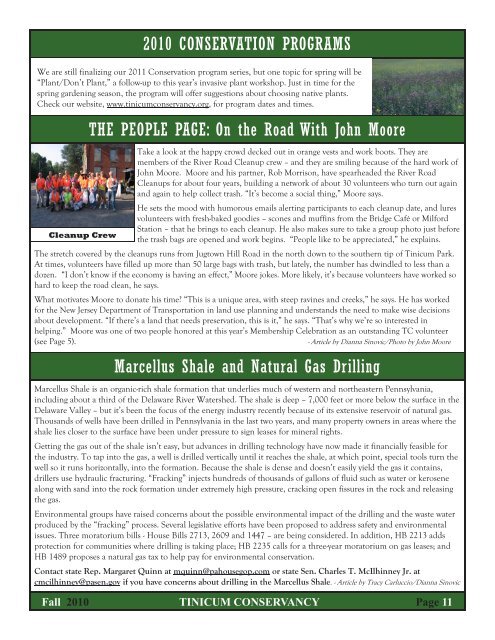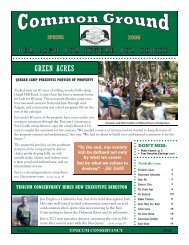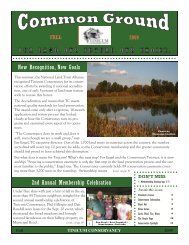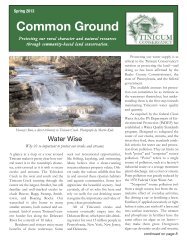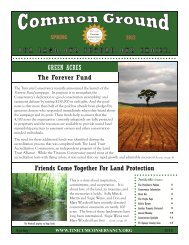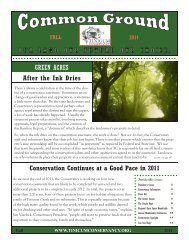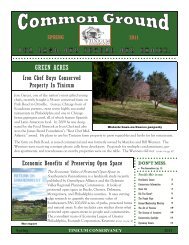Newsletter-FALL '10 FINAL FINAL - Tinicum Conservancy
Newsletter-FALL '10 FINAL FINAL - Tinicum Conservancy
Newsletter-FALL '10 FINAL FINAL - Tinicum Conservancy
You also want an ePaper? Increase the reach of your titles
YUMPU automatically turns print PDFs into web optimized ePapers that Google loves.
2010 CONSERVATION PROGRAMS<br />
We are still finalizing our 2011 Conservation program series, but one topic for spring will be<br />
“Plant/Don’t Plant,” a follow-up to this year’s invasive plant workshop. Just in time for the<br />
spring gardening season, the program will offer suggestions about choosing native plants.<br />
Check our website, www.tinicumconservancy.org, for program dates and times.<br />
Cleanup Crew<br />
THE PEOPLE PAGE: On the Road With John Moore<br />
Take a look at the happy crowd decked out in orange vests and work boots. They are<br />
members of the River Road Cleanup crew – and they are smiling because of the hard work of<br />
John Moore. Moore and his partner, Rob Morrison, have spearheaded the River Road<br />
Cleanups for about four years, building a network of about 30 volunteers who turn out again<br />
and again to help collect trash. “It’s become a social thing,” Moore says.<br />
He sets the mood with humorous emails alerting participants to each cleanup date, and lures<br />
volunteers with fresh-baked goodies – scones and muffins from the Bridge Café or Milford<br />
Station – that he brings to each cleanup. He also makes sure to take a group photo just before<br />
the trash bags are opened and work begins. “People like to be appreciated,” he explains.<br />
The stretch covered by the cleanups runs from Jugtown Hill Road in the north down to the southern tip of <strong>Tinicum</strong> Park.<br />
At times, volunteers have filled up more than 50 large bags with trash, but lately, the number has dwindled to less than a<br />
dozen. “I don’t know if the economy is having an effect,” Moore jokes. More likely, it’s because volunteers have worked so<br />
hard to keep the road clean, he says.<br />
What motivates Moore to donate his time? “This is a unique area, with steep ravines and creeks,” he says. He has worked<br />
for the New Jersey Department of Transportation in land use planning and understands the need to make wise decisions<br />
about development. “If there’s a land that needs preservation, this is it,” he says. “That’s why we’re so interested in<br />
helping.” Moore was one of two people honored at this year’s Membership Celebration as an outstanding TC volunteer<br />
(see Page 5). - Article by Dianna Sinovic/Photo by John Moore<br />
Marcellus Shale and Natural Gas Drilling<br />
Marcellus Shale is an organic-rich shale formation that underlies much of western and northeastern Pennsylvania,<br />
including about a third of the Delaware River Watershed. The shale is deep – 7,000 feet or more below the surface in the<br />
Delaware Valley – but it’s been the focus of the energy industry recently because of its extensive reservoir of natural gas.<br />
Thousands of wells have been drilled in Pennsylvania in the last two years, and many property owners in areas where the<br />
shale lies closer to the surface have been under pressure to sign leases for mineral rights.<br />
Getting the gas out of the shale isn’t easy, but advances in drilling technology have now made it financially feasible for<br />
the industry. To tap into the gas, a well is drilled vertically until it reaches the shale, at which point, special tools turn the<br />
well so it runs horizontally, into the formation. Because the shale is dense and doesn’t easily yield the gas it contains,<br />
drillers use hydraulic fracturing. “Fracking” injects hundreds of thousands of gallons of fluid such as water or kerosene<br />
along with sand into the rock formation under extremely high pressure, cracking open fissures in the rock and releasing<br />
the gas.<br />
Environmental groups have raised concerns about the possible environmental impact of the drilling and the waste water<br />
produced by the “fracking” process. Several legislative efforts have been proposed to address safety and environmental<br />
issues. Three moratorium bills - House Bills 2713, 2609 and 1447 – are being considered. In addition, HB 2213 adds<br />
protection for communities where drilling is taking place; HB 2235 calls for a three-year moratorium on gas leases; and<br />
HB 1489 proposes a natural gas tax to help pay for environmental conservation.<br />
Contact state Rep. Margaret Quinn at mquinn@pahousegop.com or state Sen. Charles T. McIlhinney Jr. at<br />
cmcilhinney@pasen.gov if you have concerns about drilling in the Marcellus Shale. - Article by Tracy Carluccio/Dianna Sinovic<br />
Fall 2010 TI�ICUM CO�SERVA�CY Page 11


